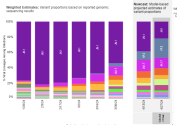Gemmie
Clam dip nose
- Joined
- Feb 4, 2014
- Messages
- 5,453
- Reaction score
- 36,771
Well, that's unfortunate as JN.1 has taken 2nd place to KP.2.
Statement on the antigen composition of COVID-19 vaccines
April 2024 statement on the antigen composition of COVID-19 vaccineswww.who.int
Statement on the antigen composition of COVID-19 vaccines
26 April 2024
- As the virus is expected to continue to evolve from JN.1, the TAG-CO-VAC advises the use of a monovalent JN.1 lineage as the antigen in future formulations of COVID-19 vaccines.
What COVID-19 variant are we on? Currently, the dominant variant nationwide is KP.2, with 24.9% of cases, followed by JN.1, with 22% of cases, and JN.1.7, with 13.7% of cases. "The original omicron variant is gone now," says Dr. Rupp. "Currently subvariants of omicron are circulating, including KQ.1, BA.2, and GE.1."

What COVID-19 variants are going around in April 2024?
Get the latest COVID-19 news from infectious diseases expert Mark Rupp, MD, including COVID-19 case rates, types of variants circulating and vaccine updates.
Not only is it unfortunate, the trend is definitely showing that JN.1 (purple) is losing ground to KP.2 (gray). Also, it appears that KP.2 is growing at a faster pace (doubling) than JN.1 is declining (baby steps).
Oh well. They didn't ask for my opinion on which variant to use for the upcoming fall formula.
ETA - my bad. I meant to include the chart showing that KP.2 is growing faster than JN.1 is declining.

COVID Data Tracker
CDC’s home for COVID-19 data. Visualizations, graphs, and data in one easy-to-use website.
covid.cdc.gov
Last edited:





